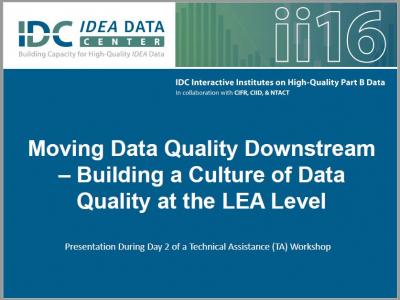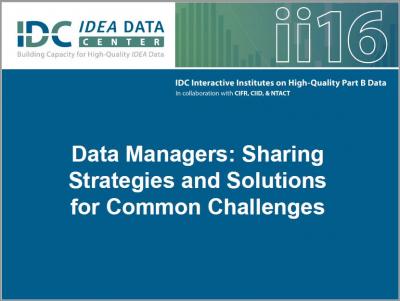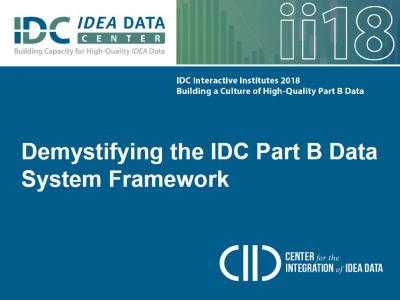Site Search
Results 1 - 4 of 4
Format: Presentations
Moving Data Quality Downstream - Building a Culture of Data Quality at the LEA LevelPresenters and participants discussed strategies that SEAs can use to help LEAs in collecting section 618 and other state-required data that is of high-quality. They explored IDC’s Knowledge Lab that lists various resources around different data collections. The Knowledge Lab contains many resources designed to help SEAs and LEAs gather, collect, validate, and report high-quality data. The discussion allowed for state input on how the state uses or can use these resources.
Format: Presentations
Data Managers: Sharing Strategies and Solutions for Common ChallengesThis role-alike presentation was a facilitated discussion by Part B Data Managers to explore strategies and solutions for meeting common challenges, such as working with LEAs to improve data quality, cross walking EDFacts data to SPP/APR indicators, and verifying that requirements for making data available to the public are fully met.
Format: Presentations
Demystifying the IDC Part B Data System FrameworkThis workshop provided participants firsthand experience working with the IDEA Data Center Part B Data System Framework to explore factors impacting data quality or ways to expand capacity in the SEA. Because the Framework is based on a whole systems approach, its use can encourage discussion and provide direction for how to tackle everyday problems and issues. Through hands-on exercises, participants explored different approaches to how states might apply the Framework to improvement efforts, planning, or organizational activities.
Format: Presentations
Digging Into the IDEA Data Quality Reports to Improve Data QualityOSEP has provided states with data quality reports, now what? This workshop explored ways states can use the IDEA Data Quality Review and Year to Year reports to improve data quality. Participants engaged in hands-on exercises to explore how the OSEP-provided reports may point to systemic issues related to internal state processes or communication. Participants explored next steps after identifying data quality issues, including applying best practices for writing data notes, incorporating lessons learned into internal processes or systems, and exploring opportunities for support or training for LEAs.





